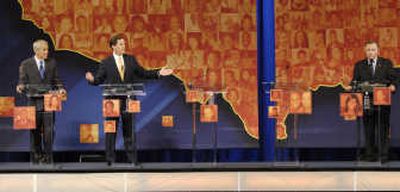GOP rivals skip racial debate

Fred Thompson was at a fundraiser in Franklin, Tenn. Mitt Romney was gathering checks in Rancho Santa Fe, Calif. Rudolph Giuliani was in California raking in some last-minute cash just north of Napa. John McCain spent the day in New York City, giving a speech and raising money.
Such were the scheduling conflicts that left the lecterns for the leading candidates for the Republican presidential nomination empty at what was billed as the first GOP debate tailored to the concerns of black voters, held Thursday night at Morgan State University in Baltimore.
“I apologize for the candidates who aren’t here. I think it’s a disgrace that they aren’t here,” Sen. Sam Brownback of Kansas, a presidential hopeful, told the audience. “I’m sorry. I’m sorry to you and I’m sorry to those who are watching that they are not here.”
Former Arkansas Gov. Mike Huckabee, another candidate who made the trip, called the situation “embarrassing” for his rivals. “We’ve come a long way, but we have a long way to go, and we don’t get there if we don’t sit down and work through issues,” he told the appreciative crowd.
The debate was hosted by PBS talk show host Tavis Smiley and attended by Brownback, Huckabee, Rep. Duncan Hunter of California, Rep. Ron Paul of Texas, Rep. Tom Tancredo of Colorado and Alan Keyes, a former ambassador who has sought the presidency twice before.
Several of the candidates took pains to cater to the mostly black audience, blaming inequality in America on continuing racism. Brownback said he wants Congress to pass a formal apology for slavery and segregation. Huckabee promised he would, as president, improve housing opportunities for minorities and address unequal treatment of different races in the criminal justice system. He also pledged to support voting rights for Washington, D.C.
By contrast, Tancredo declared that economic differences have “nothing to do with race,” and several candidates reiterated their desire to crack down on illegal immigrants. Paul loudly repeated his call for an end to the war in Iraq. Keyes blamed the plight of the black community on moral decay.
But the forum, which was pitched as a chance to discuss the “covenant with black America,” was undercut by the absence of the party’s top contenders – an outcome criticized by black activists, Democratic candidates and some senior Republican leaders.
Former House Speaker Newt Gingrich had called the decision to avoid the event an “enormous error” and “fundamentally wrong,” and had said the scheduling excuses were “baloney.”
Smiley, who had spent months wooing the Republican candidates, appeared angry in an interview on CNN the night before the debate. In the interview, with anchor Rick Sanchez, Smiley accused the leading Republican candidates of trying to avoid being confronted by black voters and black journalists.
“They’re trying to go, these front-runners, these Republican front-runners, trying to go through this entire primary process and never have to address voters of color and never be queried by journalists of color,” Smiley said. “And I think in the most multicultural, multiracial, multiethnic America ever, that, quite frankly, is unacceptable.”
The top GOP candidates refused to give in to pressure from both parties, saying they have been buried under a mountain of debate requests that are particularly difficult to accept as they race to raise money in the final days of the third fundraising quarter.